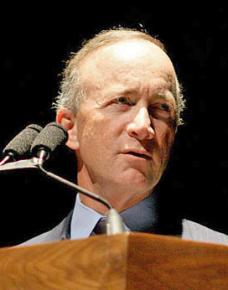A union-hater goes to Purdue
and report on the opposition to Purdue University's appointment of Gov. Mitch Daniels as its new president.
THE CORPORATE university gained another foothold last week with the appointment of Indiana Gov. Mitch Daniels as the new president of Purdue University in January 2013 when his term as governor ends.
The Purdue Board of Trustees, comprised entirely of business and corporate representatives, eight of whom were appointed by Daniels, ended a clandestine search for a new president with a unanimous vote in his favor.
Daniels made a fortune--he lists his net worth as $15.7 million--with Indiana pharmaceutical giant Eli Lilly before becoming head of the Office of Budget and Management under George W. Bush. He later ran for governor of his home state and took office in 2005
One of Daniels' first acts as governor was to strip public-sector and state employees of collective bargaining rights--the inspiration for similar campaigns like State Bill 5 in Ohio (later overturned by voters) and Gov. Scott Walker's attacks in Wisconsin. Last year, he spearheaded the passage of right-to-work legislation in Indiana, in spite of mass protests of as many as 15,000 workers at the state Capitol.

As governor, Daniels has led a vicious attack on public education and teachers unions. He has cut more than $150 million from higher education and more than $300 million from public schools. He has championed state vouchers for private schools. He has attacked unions as "privileged elites" and tried to gut the rights of Indiana teachers to have a say, through collective bargaining, on working conditions and curriculum development.
These accomplishments made Daniels a poster boy for austerity government in the late 2000s and inspired many Republicans to encourage him to run for president, since he would be a "new face."
But Daniels is no newcomer. He is the product of the neoconservative boom of the late 1990s that attempted to restore the glory of the Reagan years. For example, Daniels has been a board member and trustee of the Bradley Foundation, an ultra-right "philanthropic" group based in Milwaukee.
Bradley's founders, millionaires Lynde and Harry Bradley, were staunch anti-unionists. Harry was a charter member of the John Birch Society and referred to labor organizers as "communists." Bradley CEO Michael Grebe chaired Scott Walker's campaign for governor, and the foundation helped to bankroll his election.
Earlier, the Bradley Foundation was also a major financial contributor to the Project for a New American Century, the neoconservative cabal that formulated Bush Jr.'s strategy for a new American "hegemony" and guided the U.S. into wars for oil in the Persian Gulf and later Iraq.
The Bradley Foundation has made a conscious effort to make inroads into American universities by establishing endowed chairs and funding right-wing scholarship. Among their benefactors is Charles Murray, author of the deeply racist tract The Bell Curve, which argued for the genetic and intellectual inferiority of African Americans.
Daniels has openly praised Murray and recommended his books to others. And now Purdue's board of trustees is putting Daniels in charge of a state university with more than 1,300 African American students.
Daniels expresses other right-wing views shaped by his allegiance to Bradley, such as skepticism about climate change research. Bradley has published an entire book trying to debunk climate change science. Daniels is also anti-abortion and anti-gay marriage. As governor, he tried to eliminate the use of state funds by Planned Parenthood.
DANIELS' SELECTION as Purdue president reveals anew how higher education in general and public education in particular have become a battleground for neoliberal policies.
The scramble by many universities to raise tuition, privatize services, expand international campuses, slash labor costs and smash graduate student and faculty unions are all efforts to strip the vast majority of people of their right to a decent education. This is complemented by a concerted attack on all forms of protest by students and faculty. Our generation is not likely to forget the images of the police pepper-spraying peaceful students at the University of California Davis.
Protest against Daniels' hiring emerged almost immediately. A protest organized mainly by current and former Purdue students and community members against his appointment has been called for June 30 on the Purdue campus. A petition challenging Daniels' appointment had gathered more than 700 signatures by the weekend after it was announced.
The protest and petition point out that an Indiana law pushed through by Daniels himself requires state employees to undergo a one-year "cooling-off" period before taking employment with a different state entity. It also points out that eight of the 10 Purdue trustees who voted on Daniels were appointed by him, in conflict with the trustees' own bylaws.
Most importantly, they criticize the board of trustees and its president Michael Berghoff for using corporate logic to appoint a businessman with no academic experience as president.
Real resistance to Daniels agenda will require mass action and organizing by students linking their struggle to other similar fights by trade unionists, public school teachers and community activists who have been beaten back by years of right-wing attack. Solidarity in the face of attack is our method, and actions such as ones taken by the Chicago teachers and the students in Québec and Latin America are our tools to dismantle the corporate university.


